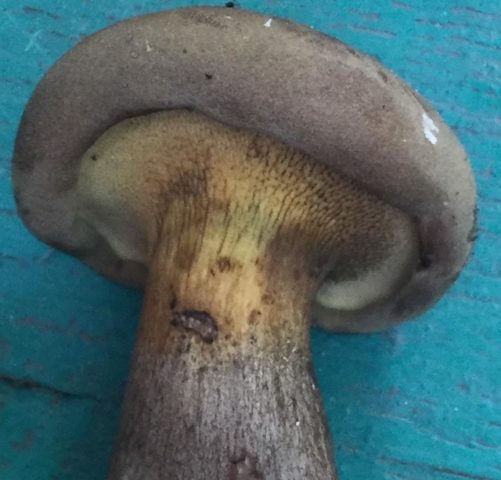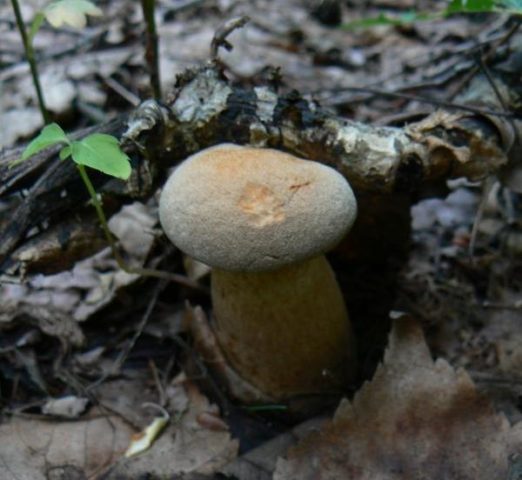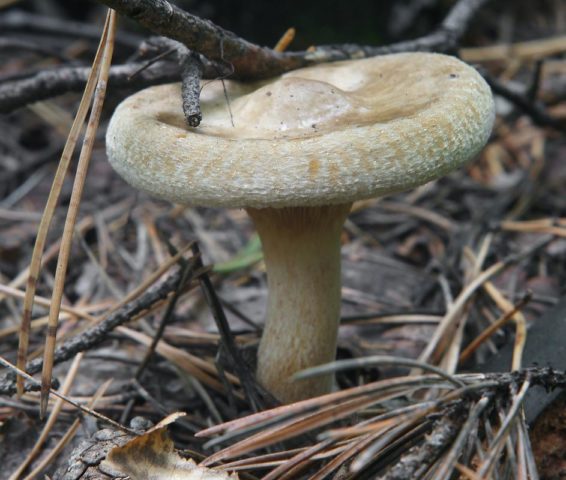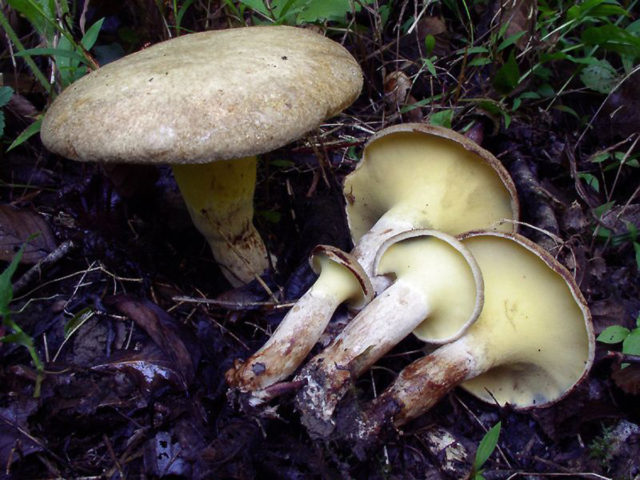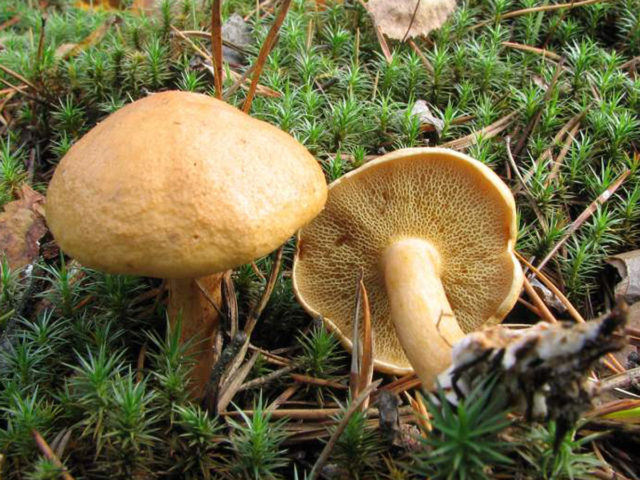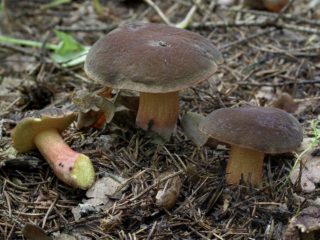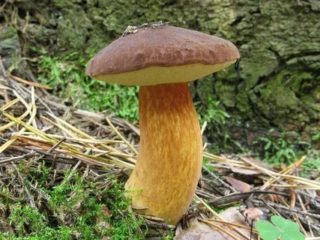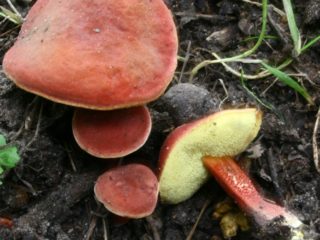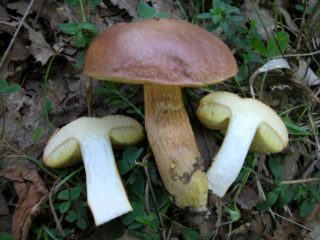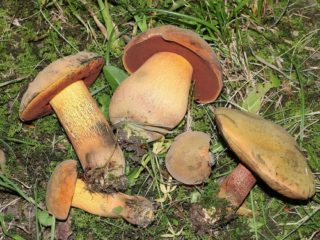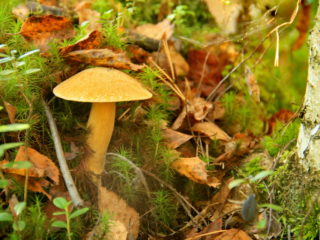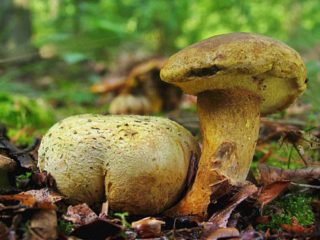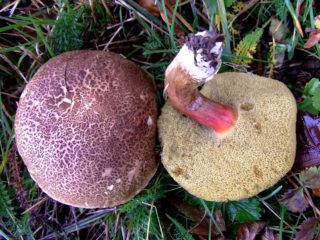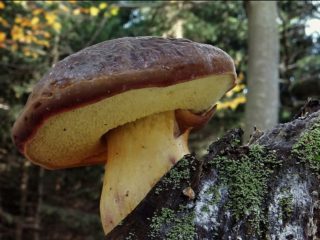Content
Larch flywheel is a tubular mushroom that has several names: Larch Boletin, Phylloporus lariceti, Boletinus lariceti. The species belongs to the third group in terms of nutritional value. Fruit bodies with low odor and mild taste are suitable for any processing method.
What do larch mushrooms look like?
Larch flywheel forms the monotypic genus Psiloboletinus (Psiloboletin) and is its only representative.
The moss got its specific name by the way of growth. It is found only near larch in pine forests or mixed forests, which include coniferous trees. It was entered into the biological reference book in 1938 by the mycologist Rolf Singer. External description of the species:
- The upper part of the fruiting body is rounded, with very concave edges; as it grows, the cap becomes prostrate, reaching an average diameter of 15 cm, but there are also larger specimens.
- The surface is velvety, dry, the edges of the cap in adult representatives are even or wavy, slightly concave.
- The color is dark gray or brown, more often uniform, possibly a small ocher spot in the center.
- The hymenophore is tubular, fine-lamellar along the edge. The pores are large, with thick walls, descending to the pedicle, visually perceived as thick plates.
- The color of the spore-bearing layer in young fruit bodies is white or light beige, turns yellow with age.
- The pulp is light, thick, dense, with a slight mushroom odor and weak taste. It turns blue at the scrap.
- The leg is of medium thickness, its length is 6-10 cm, the surface is velvety, light on top, and dark near the mycelium. It can be flat or slightly thickened at the base or in the middle.
- The larch flywheel lacks a ring on its leg and a blanket.
Where do larch mushrooms grow
The flywheel can be found only under larch, it grows more often singly, less often in 2-3 specimens. The distribution area is the Urals, the Far East, Eastern Siberia. The species is not very popular here. It grows abundantly on Sakhalin, is harvested in large quantities, the product is widely used for winter harvesting. Fruiting time is the end of August. The duration of the collection depends on the amount of precipitation, lasts within 2-3 weeks, it grows only in Russia.
Is it possible to eat larch mushrooms
It is versatile in use, does not require special processing. The product is washed from dirt, dry fragments of leaves and grass; it is suitable for frying without preliminary boiling. Larch moss is used for salads, soups, mushroom caviar. Harvested for the winter in pickled or dried form.
False doubles
A slender pig is referred to species similar to the larch moss.
Young mushrooms are very similar to each other. Adult specimens can be distinguished by the spore-bearing layer: in the pig, it is lamellar, but with wavy edges. Outwardly, it looks like a tubular, the difference is noticeable only upon close examination.When oxidized, the sap of the twin turns brown instead of blue. The species contains lectins in the chemical composition - toxic compounds that are preserved during heat treatment.
A poisonous twin grows in all types of forests, often settles on trunks, rarely occurs singly, mainly forms colonies.
Another double - glaucous gyrodon or alder wood, grows in symbiosis with alder. This is the main distinguishing feature of the species.
The tubular mushroom has a high nutritional value. Damage spots turn bluish, then darken to brown. Gyrodon is a rare mushroom, protected by law in some European countries.
Another representative of the mushroom kingdom can be called a double: the Goat belongs to the genus Butter, characterized by a low nutritional value.
Considered conditionally edible, included in the last (IV) category. By the color of the fruit body, the twin is lighter than the larch flyworm. The pulp is yellow, on the break it becomes pink, then red. Forms mycorrhiza with pine.
Collection rules
The main condition is not to pick mushrooms in an ecologically polluted area. Places of growth near industrial enterprises, highways, gas stations, landfills are not considered.
Only young specimens are taken, from overripe larch flyworms the hymenophore becomes jelly-like and separates from the cap, the decomposing protein gives the mushroom an unpleasant odor, such fruit bodies are not harvested due to the poor presentation, as well as the appearance in their composition of toxins that can cause severe poisoning.
Use
Larch flywheel does not have a bright taste and smell, but it is quite suitable for all types of processing. Fruit bodies can be used immediately for cooking. It has been proven by laboratory studies that larch flyworm secretes an enzyme that has a thrombolytic effect. In folk medicine, dry mushroom or decoctions are used to thin the blood and prevent blood clots.
Conclusion
Larch moss is the only representative of the genus Psilobolethin, which is distributed only in Russia (mainly in Western Siberia and the Urals). A mushroom with low nutritional value, edible, used in all types of processing. It grows only under larch.
